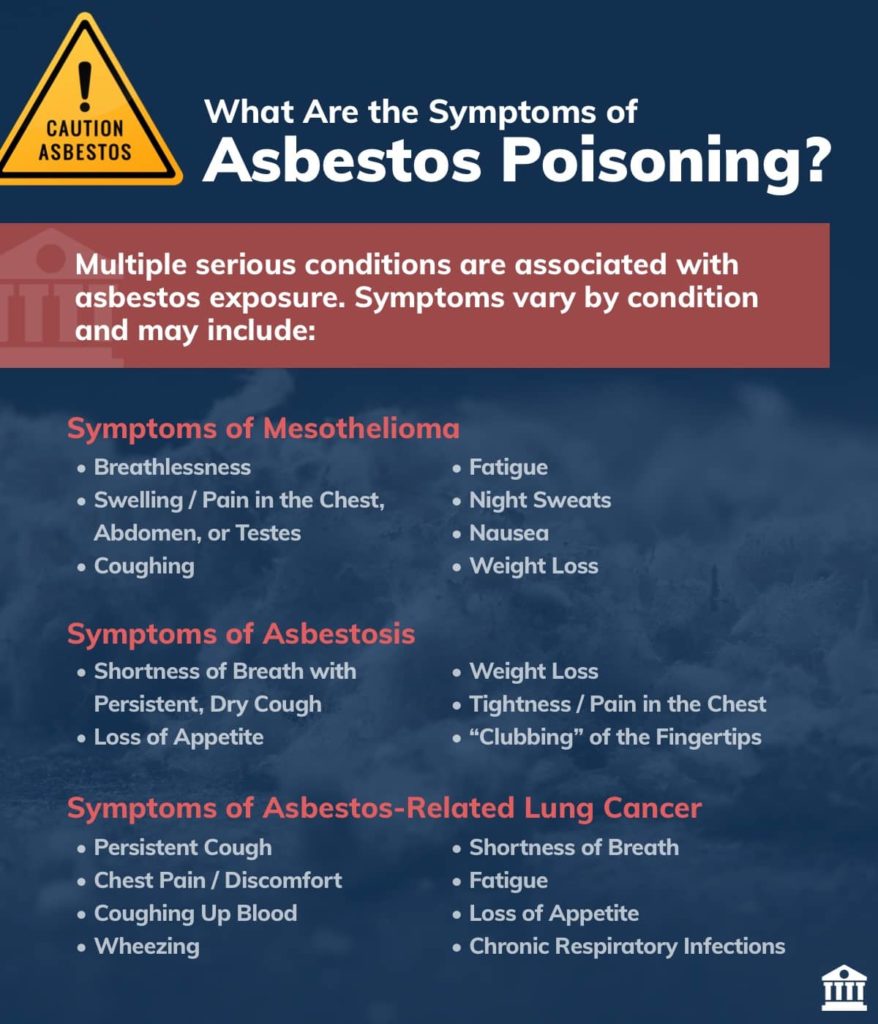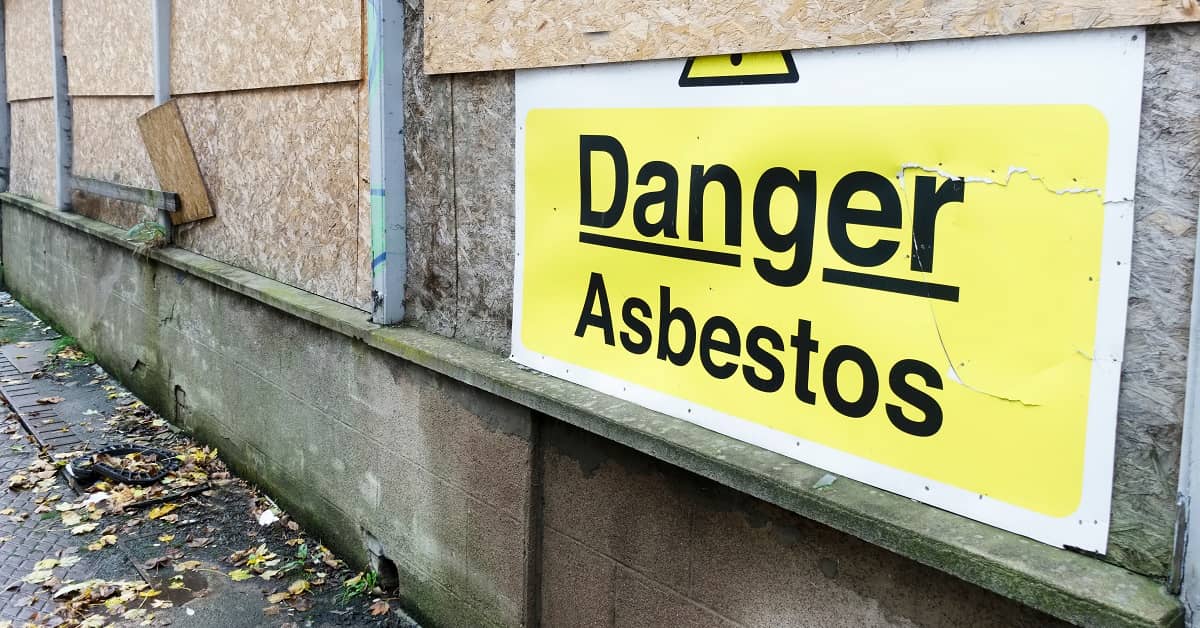Symptoms of Asbestos Exposure
November 14, 2022 | By Colombo Law
Asbestos is a naturally occurring fibrous mineral that has been used for thousands of years in insulation, water lines, cement boards, and other materials. Today, asbestos is recognized as extremely harmful to humans. However, before this danger was realized, asbestos use was widespread – the material is still found in buildings across the country.
The continued presence of asbestos can pose a serious, life-threatening danger to anyone who is exposed to asbestos. Serious conditions associated with asbestos exposure include asbestosis, mesothelioma, pleural diseases, and lung cancer.
Regardless of the specific disease or condition, one of the most difficult things for those exposed to asbestos is that there are no immediate, identifiable signs of asbestos exposure before a disease develops. The onset of symptoms can take decades.
If you believe that your health or the health of a loved one has suffered as a result of asbestos exposure, it is in your best interest to contact an asbestos lawyer as soon as possible. The attorneys at Colombo Law can review your case for free and advise you of your options for recovering compensation.

Health Issues Associated with Asbestos
According to the World Health Organization, “about 125 million people in the world are exposed to asbestos at the workplace” each year. In addition, “approximately half of the deaths from occupational cancer are estimated to be caused by asbestos.”
These are astounding numbers that demonstrate just how deadly asbestos is – and how many lives it impacts every single year.
That said, asbestos exposure does not affect everyone in the same way. In some cases (such as with asbestosis and some pleural diseases), asbestos exposure can cause benign diseases that may or may not lead to complications. In other cases, however (including mesothelioma and lung cancer), asbestos exposure can cause malign cancers that can be deadly.
Symptoms of Asbestosis
Asbestos is a strong mineral that, when inhaled, can cause damage to the lungs. This damage can lead to scarring. Over time, the lungs can become stiff, leading to various lung-related symptoms.
This condition is called asbestosis. While it is not directly fatal, it can lead to respiratory and cardiac failure. Symptoms of asbestosis include:
- Shortness of breath with a persistent, dry cough
- Loss of appetite
- Weight loss
- Tightness or pain in the chest
- “Clubbing” of the fingertips
Symptoms of Mesothelioma
Mesothelioma is a very deadly type of cancer that can develop due to asbestos exposure. There is currently no cure for mesothelioma, although there are some treatment options that can improve a patient’s prognosis.
Mesothelioma can take different forms, including:
- Pleural mesothelioma: The most common type of mesothelioma (occurring in 75 percent of cases) that forms in the lungs
- Peritoneal mesothelioma: Forms in the lining of the abdominal cavity
- Pericardial mesothelioma: Forms in the lining of the heart
- Testicular mesothelioma: Forms in the lining of the testicles
Symptoms of mesothelioma depend on the type, but can include:
- Breathlessness
- Swelling/pain in the chest, abdomen, or testes
- Coughing
- Fatigue
- Night sweats
- Nausea
- Weight loss
Many of the symptoms of mesothelioma closely resemble the symptoms of other, less serious conditions. For this reason, it is important to notify your healthcare provider of any known asbestos exposure.
Asbestos-Related Pleural Diseases
Pleural diseases are diseases that affect the tissue – called the pleura – that covers the lungs. Asbestos can affect this tissue in several ways, including pleural plaques and pleural effusion.
Pleural plaques occur when your body’s immune system responds to asbestos, creating a buildup of plaque in the pleura. There are usually no symptoms, though pleural plaques can lead to complications.
Pleural effusion occurs when there is an increase of fluid in the lungs, filling the space between pleural layers. Symptoms can include a cough, chest pain, and trouble breathing. Pleural effusion may also be a symptom of mesothelioma.
Asbestos-Related Lung Cancer
Asbestos may also lead to lung cancer, causing six times more cases of lung cancer than mesothelioma. It is particularly dangerous when combined with tobacco smoke.
Symptoms of asbestos-related lung cancer include:
- Persistent cough
- Chest pain/discomfort
- Coughing up blood
- Wheezing
- Shortness of breath
- Fatigue
- Loss of appetite
- Chronic respiratory infections
What to Do If You Were Exposed to Asbestos
The first thing to do if you have been exposed to asbestos is to speak with your doctor. If your exposure was limited, there is a small chance it will be harmful. If, after time passes, you begin to experience symptoms, you should get a diagnosis as quickly as possible. This is important for both your medical and legal situations.
You also should get in touch with an attorney immediately after your diagnosis to help determine your legal options.
Contact an Asbestos Lawyer Today
Asbestos-related diseases place a tremendous burden on individuals and their families. Treatment can be expensive, and it may affect your ability to work and enjoy the long, happy life you otherwise might have had.
Colombo Law is here to help. We understand what you are going through and we know how to hold individuals and companies accountable when their negligence leads to asbestos exposure.
Please call Colombo Law today at (304) 599-4229 for a free case review. Our asbestos and mesothelioma attorneys serve clients in Morgantown and throughout West Virginia.


